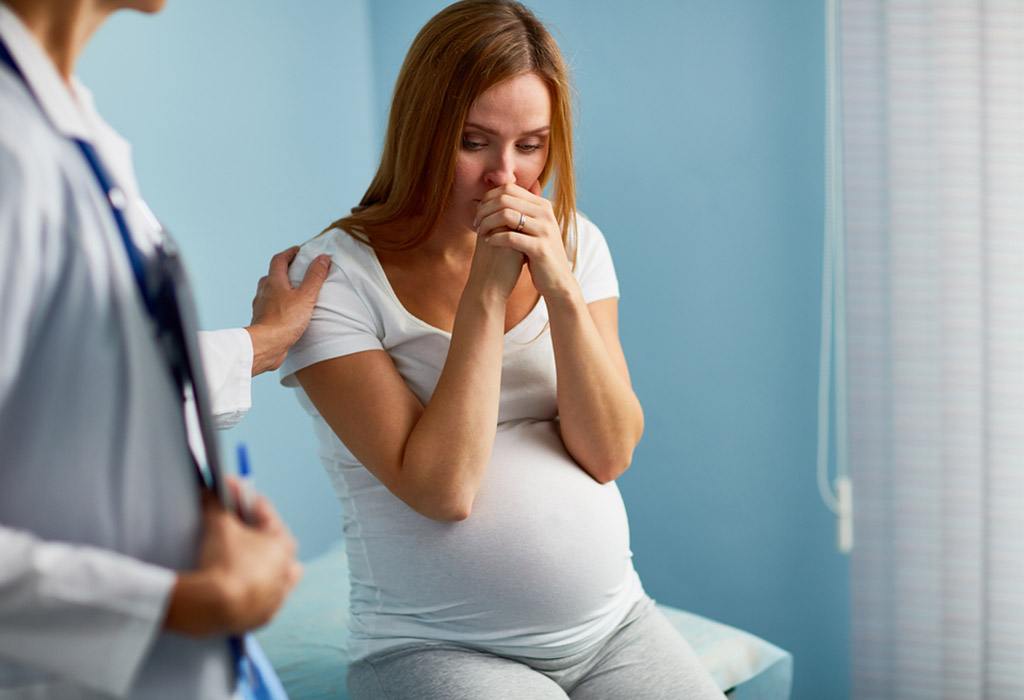Anxiety is a common feeling for pregnant women. About 1 in 5 pregnant women experience anxiety, according to the Anxiety and Depression Association of America. If you are one of those women, you may be wondering what it all means and what you can do about it. In this blog post, we will discuss the signs and symptoms of anxiety and pregnancy, also the link between the two. We will also provide some tips to manage both conditions.
Contents
Defining Anxiety And Pregnancy
 Anxiety and pregnancy are often spoken of together because anxiety is a common emotion during pregnancy. But what exactly is anxiety?
Anxiety and pregnancy are often spoken of together because anxiety is a common emotion during pregnancy. But what exactly is anxiety?
Anxiety is defined as “a feeling of worry, nervousness, or unease, typically about an imminent event or something with an uncertain outcome.”
For some people, anxiety can be a normal and expected response to the stressors of pregnancy. After all, pregnancy is a time of many physical and emotional changes, as well as significant life transitions.
However, for others, anxiety can be more than just a normal response to pregnancy. It can be a sign of an underlying anxiety disorder. Moreover, it is believed that anxiety during pregnancy can have an impact on the developing fetus.
Therefore, it is important to be aware of the signs and symptoms of anxiety. And, about the link between anxiety and pregnancy.
Signs and Symptoms of Anxiety During Pregnancy
There are a variety of signs and symptoms that may be indicative of an anxiety disorder during pregnancy. These can include:
- Excessive worry or fear about a variety of topics, events, or activities
- Restlessness or feeling “on edge”
- Fatigue
- Difficulty concentrating
- Irritability
- Muscle tension or headaches
- Sleep problems (insomnia or restless sleep)
The signs and symptoms can be mild to severe and can vary from day to day. If you are experiencing any of these symptoms, it is important to talk to your healthcare provider. In fact, the symptoms of anxiety can mimic other conditions, so it is important to rule out any other potential causes.
Therefore, it is important to talk to your doctor if you are experiencing any of the above symptoms, especially if they are interfering with your daily life.
Anxiety during pregnancy is relatively common, affecting up to 20% of pregnant women. While anxiety can be a normal and healthy response to the stressors of pregnancy, it can also be a sign of an underlying condition.
Link Between Anxiety And Pregnancy
 There is a link between anxiety and pregnancy, but it is not clear what causes this link. Anxiety is a common emotion that can be experienced during pregnancy, and it is normal to feel some anxiety about the changes that are happening in your body and the responsibility of caring for a new life.
There is a link between anxiety and pregnancy, but it is not clear what causes this link. Anxiety is a common emotion that can be experienced during pregnancy, and it is normal to feel some anxiety about the changes that are happening in your body and the responsibility of caring for a new life.
However, some women experience more severe anxiety that interferes with their daily lives. If you are struggling with anxiety during pregnancy, it is important to talk to your doctor or midwife about how you are feeling.
Moreover, there are some common causes that can contribute to anxiety during pregnancy, such as:
Hormonal changes
The hormone levels in your body are constantly changing during pregnancy, which can affect your mood and energy levels. This cause is most likely to affect women who have a history of anxiety or depression. However hormonal changes are not the only cause of anxiety during pregnancy.
Life changes
Pregnancy can be a time of many life changes, such as starting a new job or moving to a new house. These changes can be exciting, but they can also be stressful. If you are experiencing anxiety during pregnancy, it may be helpful to talk to your partner or a friend about your concerns.
Body image issues
Many pregnant women worry about how their bodies will look after the baby is born. This can be especially true if you have had body image issues in the past. In addition, the media often portrays pregnant women as being perfect and happy, which can add to the anxiety that they are feeling.
Sleep deprivation
It is common to have trouble sleeping when you are pregnant, which can lead to fatigue and irritability. Also, as your pregnancy progresses, it can become more difficult to find a comfortable position to sleep in. If you are having trouble sleeping, talk to your doctor about ways to improve your sleep habits.
Anxiety disorders
If someone is already dealing with any type of anxiety disorder then there are high chances of it getting worse during pregnancy. In fact, many women are first diagnosed with an anxiety disorder during pregnancy. To put it simply, anxiety disorder is a type of mental illness that can cause a person to feel extremely anxious or scared, even when there is no reason to be.
Pregnancy is a beautiful and amazing time, but it can also be a time of great anxiety. So, these reasons are the causes of anxiety during pregnancy. If you are pregnant and struggling with anxiety, know that you are not alone and there is help available.
Impacts Of Anxiety During Pregnancy
 It is very common for women to experience anxiety during pregnancy. After all, you are growing a human being inside of you and everything is new! It is important to know that anxiety during pregnancy is normal and manageable.
It is very common for women to experience anxiety during pregnancy. After all, you are growing a human being inside of you and everything is new! It is important to know that anxiety during pregnancy is normal and manageable.
There are a few things that can happen if you experience anxiety during pregnancy. Some of these negative impacts could be:
Difficulty sleeping
This impact can actually be a cause of anxiety. It can be hard to fall asleep when you are worrying about everything that is going on. Pregnancy can also cause physical discomfort that makes it difficult to get comfortable and fall asleep.
Lack of appetite or overeating
During pregnancy, it seems like everything you eat or don’t eat could have an impact on your baby. This can lead to anxiety around food and either not eating enough or overeating. More often, overeating can happen as a way to comfort yourself.
Tension in relationships
Pregnancy can be a difficult time for relationships. If you are feeling anxious, it can be difficult to communicate with your partner and may put a strain on your relationship. It is important to talk about how you are feeling and ask for help when needed. Anxiety can also lead to physical symptoms like:
- Upset stomach
- Headaches
- Muscle tension
These physical symptoms can cause even more anxiety. It can feel like a never-ending cycle. So, the tension in relationships can also be a result of anxiety.
Feeling irritable or on edge
The cycle of pregnancy and anxiety can be exhausting. It is common to feel irritable or on edge when you are dealing with anxiety. This is another reason why it is important to ask for help and support from loved ones. Moreover, irritation is the primary reason for the development of wrinkles.
Excessive worry about the baby’s health
It is often the worry about the baby’s health that leads to anxiety in pregnant women. You want to do everything you can to make sure your baby is healthy and safe. This worry can be all-consuming and lead to a lot of stress.
These are just some of the ways that anxiety can impact you during pregnancy. It is important to remember that you are not alone. Many women experience anxiety during pregnancy and there are resources to help you. If you are feeling anxious, talk to your doctor or mental health professional. They can help you develop a plan to manage your anxiety and keep you and your baby healthy.
How To Manage Anxiety And Pregnancy?
 When you’re pregnant, you may worry about your baby’s health, your ability to be a good mother, and the changes pregnancy will bring to your body and your life. It’s normal to feel some anxiety during pregnancy. For some women, though, anxiety can be severe and constant.
When you’re pregnant, you may worry about your baby’s health, your ability to be a good mother, and the changes pregnancy will bring to your body and your life. It’s normal to feel some anxiety during pregnancy. For some women, though, anxiety can be severe and constant.
So, if you have severe anxiety during pregnancy, it can take a toll on your health and the health of your baby. There are some things you can do to manage anxiety and pregnancy:
Talk to your doctor
This is a good first step. Your doctor can help you understand what’s causing your anxiety and offer suggestions for how to manage it. Also, they can rule out any health conditions that may be causing or contributing to your anxiety. Your primary doctor, however, not be able to guide you properly for your mental health. But, surely they can guide you to the right place.
Get support
It can be helpful to talk to someone who understands what you’re going through, such as a friend, family member, or counselor. If you don’t have anyone you feel comfortable talking to about your anxiety. There are many online support groups for pregnant women with anxiety. But, more often family and your loved ones’ support are the best cure for anxiety.
Exercise regularly
Regular exercise can help reduce anxiety. It also has other benefits, such as helping you sleep better, improving your mood, and reducing stress. If you don’t exercise regularly, start with some simple activities like walking or swimming. You can also talk to your doctor about what exercises are safe for you during pregnancy.
Yoga and meditation
Yoga and meditation can help you relax and focus on the present moment. There are many different types of yoga, so you can find one that’s right for you. You don’t need to be flexible to do yoga – there are modifications for all fitness levels. If you’re new to yoga or meditation, there are classes and apps that can help you get started.
Get enough sleep
Sleep deprivation can make anxiety worse. When you’re pregnant, it’s important to get enough sleep. This can be difficult, especially in the later stages of pregnancy when it’s hard to get comfortable. There are a few things you can do to try to get better sleep:
- Go to bed and get up at the same time every day.
- Create a wind-down routine to help you relax before bed. such as reading, taking a bath, or stretching.
- Avoid caffeine and alcohol before bed.
- Keep your bedroom cool, dark, and quiet.
Avoid substance abuse
 Substance abuse can make anxiety worse. If you’re using drugs or alcohol to cope with anxiety, then immediately you need to stop that. Substance abuse can also lead to other health problems, such as addiction and overdose. You should understand that alcohol and other substances are not the solutions to your anxiety. In fact, they will only make your anxiety worse in the long run.
Substance abuse can make anxiety worse. If you’re using drugs or alcohol to cope with anxiety, then immediately you need to stop that. Substance abuse can also lead to other health problems, such as addiction and overdose. You should understand that alcohol and other substances are not the solutions to your anxiety. In fact, they will only make your anxiety worse in the long run.
When you avoid this, you will surely feel better and relaxed. Moreover, your baby will also be safe. So, you should take care of your anxiety as well as your baby’s health.
Eat healthy diet
A healthy diet is always an important aspect to take care of. But, when you’re pregnant, it’s even more important. Eating a healthy diet can help reduce stress and improve your mood. It’s also important for the health of your baby. So, make sure to eat plenty of fruits, vegetables, whole grains, and lean protein. In this way, you can take care of both your health and your baby’s health.
Take time for yourself
Pregnancy can be a demanding time. You may feel like you have to put your needs last. But, it’s important to take time for yourself. This can help reduce stress and improve your mood. It can also give you time to do things that make you happy. So, make sure to schedule some “me” time into your week. This can be anything from taking a yoga class to getting a manicure.
Consider therapy
Therapies are important if you are struggling with anxiety. There are many different types of therapy, such as cognitive-behavioral therapy (CBT), that can help you learn how to manage anxiety. A mental health professional can help you find the right therapy for you. Moreover, with therapy, you can understand your anxiety and how to deal with it in a better way.
So, these are some prominent ways to deal with anxiety during pregnancy. You should consider these ways and stay healthy and happy throughout your pregnancy period. Because pregnancy duration is a very sensitive and special phase of a woman’s life.
Conclusion
To conclude, anxiety and pregnancy are not a good combination. If you are pregnant and have anxiety, it is important to seek help from your healthcare provider or mental health professional. There are many treatment options available that can help you manage your anxiety and keep you and your baby healthy. You need to understand that you are not alone in this and that there are people who can help you through it. Do not suffer in silence, reach out for help today.
For more information, please contact MantraCare. Anxiety is a common mental health condition characterized by persistent feelings of worry, fear, and apprehension. If you have any queries regarding Online Anxiety Counseling experienced therapists at MantraCare can help: Book a trial Anxiety therapy session


